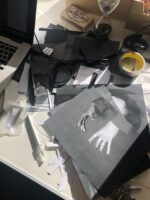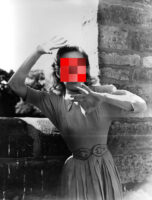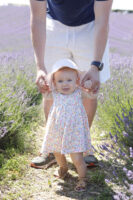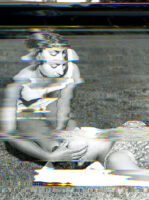![HERO Alexandra Lethbridge, from the series The Archive of Gesture, 2020-ongoing. Courtesy the artist. Web RS Image: Alexandra Lethbridge, from the series [The Archive of Gesture], 2020-ongoing. Courtesy the artist.](https://photo.org.au/api/wp-content/uploads/2022/02/HERO-Alexandra-Lethbridge-from-the-series-The-Archive-of-Gesture-2020-ongoing.-Courtesy-the-artist.-Web-RS-148x200.jpg)
Image: Alexandra Lethbridge, from the series The Archive of Gesture, 2020-ongoing. Courtesy the artist.
Q&A with Alexandra Lethbridge
31.3.22
Alexandra Lethbridge lives and works in Fareham, England. Lethbridge is a conceptual artist working with photography and installation. Her practice includes the use of found and appropriated imagery, sculpture and moving image.
Hello, please start by telling us something about yourself that is not in your bio.
My unofficial bio… I’m not a fan of boats, I have a huge sweet tooth, and I only recently started drinking coffee. I also have the most wonderful 18 month old daughter, who might have had a helping hand in my recent coffee uptake.

Olivia, Lethbridge's daughter. Image courtesy the artist.
Can you explain your artistic processes to us (research, methods, processes, rituals, etc)? Has this changed over time?
My process starts with a question I want to know the answer to. I then spend a long time researching lots of different subject matter, trying to find an answer, or something that triggers my interest to know more. Once I find that, I dig deeper and begin to make images. This is usually an intense period; the images all seem to come at once. I work with lots of different materials, and I usually have an idea of a technique or aesthetic that I’d like to try. These usually borrow from the visual language of whatever subject matter I’ve landed on. Once the images are complete, I work on making them live in the real world, usually through installations or occasionally in book format. This third part is important as I don’t think the creative work is complete until these elements are resolved.
My process hasn’t changed drastically over time, but I’ve learnt to accept this as the way I make work.

Lethbridge's studio. Image courtesy the artist.
As an artist/creative, where do you draw inspiration for your work from?
Usually, it’s from something that makes me think about something I can’t make sense of, or that I want to know more about. It can come from anywhere, but it stays on my mind. For example, a previous series of mine, Other Ways of Knowing, came from doing jury service. The case raised a question for me around what happens when we don’t have access to information, or it’s withheld. That question became the basis for the work because I felt there was something interesting there to explore. All my work is metaphorical so it’s questions like these that act as inspiration.

Image: Alexandra Lethbridge, from the series Other Ways of Knowing, 2016. Courtesy the artist.
What led you to photography (rather than any other artforms)?
I stay open to new ways of working and while images form the basis of my works, I’d happily add other artforms to a project if it was related to the ideas. I think photography is closer to how I think so it helps me express myself. I’m extremely grateful to have come across it early on so I have the chance to keep expanding and seeing where I can push my photographic practice.
What do you treasure the most? Why?
My family. With everything that is happening in the world currently, it’s a firm reminder to treasure what you love, and my daughter and husband are that for me. Reading about the war in Ukraine and families being ripped apart, it’s unthinkable. I’m grateful every day for my family being safe and healthy.

Lethbridge's family. Image courtesy the artist.
What do you hope your legacy will be?
I hope that my work will have relevancy and be part of ongoing conversations and debates.
What advice would you give to your 15 year-old self?
I’d give her a hug and tell her not to cut her own hair, it doesn’t work out.

Image: Alexandra Lethbridge, from the series Other Ways of Knowing, 2016. Courtesy the artist.